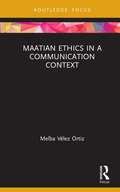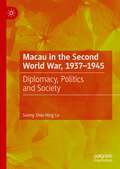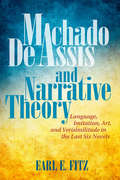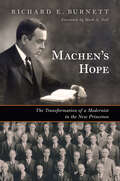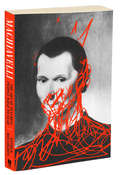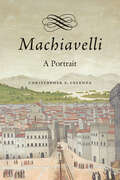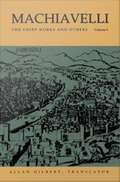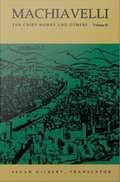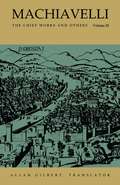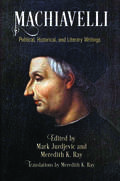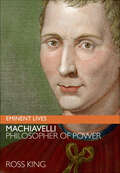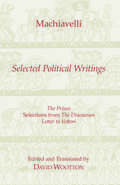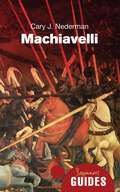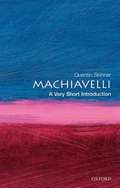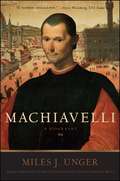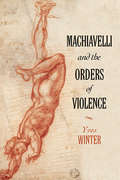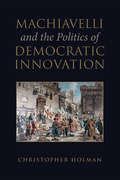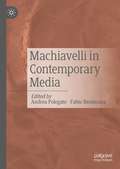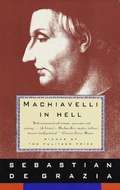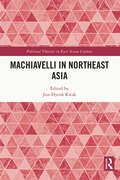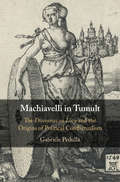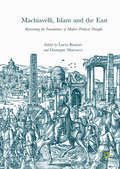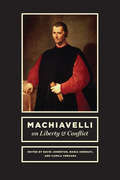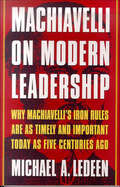- Table View
- List View
Maatian Ethics in a Communication Context (Routledge Focus on Communication Studies)
by Melba Vélez OrtizMaatian Ethics in a Communication Context explores the ethical principle of Maat: the guiding principle of harmony and order that permeated classical African political and civil life. The book provides a rigorous, communication-focused account of the ethical wisdom ancient Africans cultivated and is evidenced in the form of recovered written texts, mythology, stelae, prescriptions for just speech, and the hieroglyphic system of writing itself. Moving beyond colonial stereotypes of ancient Africans, the book offers insight into the African value systems that positioned humans as inextricably embedded in nature, and communication theory that anchors good communication in careful listening habits as the foundational moral virtue. Expanding on the work of Maulana Karenga, Molefi Kete Asante and other groundbreaking scholars, the book presents a picture of civilizations with a shared lust for life, a spiritual connection to scientific speech, and the veneration of ancestors as deeply connected to the pursuit of wisdom. Offering an examination of Maat from a specifically communication ethics perspective, this book will be of great interest to scholars and students of Communication Ethics, African philosophy, Rhetorical theory, Africana Studies and Ancient History.
Macau in the Second World War, 1937-1945: Diplomacy, Politics and Society
by Sonny Shiu-Hing LoThis book offers a re-interpretation of the political history of Macau from 1937 to 1945, during which Japan and China were engulfed in the Second World War. Using an array of English and Chinese sources, the author explores the diplomatic and social landscape of war-time Macau under Portuguese colonial rule. By framing this analysis within the concept of Portuguese ‘neutrality’, the book builds on the political history of Macau and provides new insights into the role of Japanese collaborators and Communist guerrillas. Seeking to answer important questions such as why Macau was not invaded by Japan in the Second World War, and what role the Nationalist Party Government played during this period, this book presents a new approach to examining Macau’s diplomatic history. A unique read for scholars of Chinese history, this book will also appeal to those researching diplomatic and political history during the Second World War.
Machado de Assis and Narrative Theory: Language, Imitation, Art, and Verisimilitude in the Last Six Novels (Bucknell Studies in Latin American Literature and Theory)
by Earl E. FitzThis book makes the argument that Machado de Assis, hailed as one of Latin American literature’s greatest writers, was also a major theoretician of the modern novel form. Steeped in the works of Western literature and an imaginative reader of French Symbolist poetry, Machado creates, between 1880 and 1908, a “new narrative,” one that will presage the groundbreaking theories of Swiss linguist Ferdinand de Saussure by showing how even the language of narrative cannot escape being elusive and ambiguous in terms of meaning. It is from this discovery about the nature of language as a self-referential semiotic system that Machado crafts his “new narrative.” Long celebrated in Brazil as a dazzlingly original writer, Machado has struggled to gain respect and attention outside the Luso-Brazilian ken. He is the epitome of the “outsider” or “marginal,” the iconoclastic and wildly innovative genius who hails from a culture rarely studied in the Western literary hierarchy and so consigned to the status of “eccentric.” Had the Brazilian master written not in Portuguese but English, French, or German, he would today be regarded as one of the true exemplars of the modern novel, in expression as well as in theory. Published by Bucknell University Press. Distributed worldwide by Rutgers University Press.
Machen's Hope: The Transformation of a Modernist in the New Princeton
by Richard E. BurnettThe first critical biography of J. Gresham Machen, examining the full arc of his intellectual career J. Gresham Machen is known as a conservative hero of the fundamentalist-modernist controversy. But was he always so staunchly antimodernist? In this sweeping new biography, Richard E. Burnett examines the whole of Machen&’s life and career—from his early years at Princeton, to his experience in the First World War, to his founding of Westminster Theological Seminary . Burnett pays special attention to topics that have received little attention from biographers, like Machen&’s crisis of faith and his support for historical criticism of Scripture. Incorporating all of Machen&’s major works as well as his previously unpublished private correspondence, Burnett crafts a nuanced narrative of Machen&’s intellectual journey from enthusiastic modernist to stalwart conservative. Nuanced and thorough, Machen&’s Hope will challenge scholars&’ assumptions about Machen and his dynamic era.
Machiavelli: The Art of Teaching People What to Fear
by Patrick BoucheronIn a series of poignant vignettes, a preeminent historian makes a compelling case for Machiavelli as an unjustly maligned figure with valuable political insights that resonate as strongly today as they did in his time. Whenever a tempestuous period in history begins, Machiavelli is summoned, because he is known as one for philosophizing in dark times. In fact, since his death in 1527, we have never ceased to read him to pull ourselves out of torpors. But what do we really know about this man apart from the term invented by his detractors to refer to that political evil, Machiavellianism?It was Machiavelli's luck to be disappointed by every statesman he encountered throughout his life—that was why he had to write The Prince. If the book endeavors to dissociate political action from common morality, the question still remains today, not why, but for whom Machiavelli wrote. For princes, or for those who want to resist them? Is the art of governing to take power or to keep it? And what is &“the people?&” Can they govern themselves? Beyond cynical advice for the powerful, Machiavelli meditates profoundly on the idea of popular sovereignty, because the people know best who oppresses them.With verve and a delightful erudition, Patrick Boucheron sheds light on the life and works of this unclassifiable visionary, illustrating how we can continue to use him as a guide in times of crisis.
Machiavelli: A Portrait
by Christopher S. Celenza&“Explores why . . . The Prince . . . continues to enthrall readers and . . . can help enrich the way we understand [the statesman]. . . . A compelling portrait&” (Kirkus Reviews). The man whose name is shorthand for all that is ugly in politics was more nuanced than his reputation suggests. Christopher Celenza&’s portrait of Machiavelli removes the varnish to reveal not just the hardnosed philosopher but the skilled diplomat, learned commentator on ancient history, comic playwright, tireless letter writer, and thwarted lover. &“Machiavellian. The very word calls up images of plots, daggers and devious minds. Christopher Celenza separates the man from the melodrama.&” —Sydney Morning Herald &“Both readable and trustworthy.&” —Steve Donoghue, Open Letters Monthly &“Demonstrates how Machiavelli&’s thoughts on conflict and leadership are relevant to today&’s political world.&” —Choice &“By setting the author of The Prince in his historical context, Christopher Celenza captures the brilliance, risk-taking, danger, and sheer exuberant delight of the Italian Renaissance . . . Celenza enables us to seize upon what continues to be relevant in [Machiavelli&’s] work to our own time and place.&” —Stephen Greenblatt, Pulitzer Prize–winning author of The Swerve: How the World Became Modern &“Celenza&’s Machiavelli is a man passionately engaged in history, a scholar of the past whose interests run from the remote annals of ancient Rome to the tormented chronicles of early modern Italy, and an unflaggingly committed participant in the events of his own time. The result is a singularly humane portrait of a wise man making his way through what was often a cruel, chaotic world.&” —Ingrid Rowland, University of Notre Dame
Machiavelli: The Chief Works and Others, Volume 1
by Allan Gilbert Nicollò di Bernado dei MachiavelliIncludes:<P><P> * The Prince<P> * The Legations<P> * Discourses<P> * and more<P> From praise for the 1965 edition: Allan Gilbert is unquestionably the most accurate and reliable translator of Machiavelli into English; the publication of this edition is an altogether happy occasion. Students of the history of political thought owe a particular debt of gratitude to Allan Gilbert. "--Dante Germino, The Journal of Politics "A most remarkable achievement. "--Felix Gilbert, Renaissance Quarterly
Machiavelli: The Chief Works and Others, Volume II
by Allan Gilbert Nicollò di Bernado dei MachiavelliIncludes:<P><P> * The Life of Castruccio Castracani of Lucca, <P> * The Art of War<P> * Maciavelli's Comedies: Mandragoa and Clizia<P> * Carnival Songs<P> * Letter and more<P> From praise for the 1965 edition: Allan Gilbert is unquestionably the most accurate and reliable translator of Machiavelli into English; the publication of this edition is an altogether happy occasion. Students of the history of political thought owe a particular debt of gratitude to Allan Gilbert. "--Dante Germino, The Journal of Politics "A most remarkable achievement. "--Felix Gilbert, Renaissance Quarterly
Machiavelli: The Chief Works and Others, Volume III
by Allan Gilbert Nicollò di Bernado dei MachiavelliIncludes: <P><P> * The History of Florence<P> * The Natures of Florentine Men<P> * The Decennale<P> * and more<P> From praise for the 1965 edition: Allan Gilbert is unquestionably the most accurate and reliable translator of Machiavelli into English; the publication of this edition is an altogether happy occasion. Students of the history of political thought owe a particular debt of gratitude to Allan Gilbert. "--Dante Germino, The Journal of Politics "A most remarkable achievement. "--Felix Gilbert, Renaissance Quarterly
Machiavelli: Political, Historical, and Literary Writings (Haney Foundation Series #13)
by Mark Jurdjevic Meredith K. RayThroughout his life, Niccolò Machiavelli was deeply invested in Florentine culture and politics. More than any other priority, his overriding central concerns, informed by his understanding of his city's history, were the present and future strength and independence of Florence. This volume highlights and explores this underappreciated aspect of Machiavelli's intellectual preoccupations.Transcending a narrow emphasis on his two most famous works of political thought, The Prince and the Discourses on Livy, Mark Jurdjevic and Meredith K. Ray instead present a wide sample of the many genres in which he wrote—not only political theory but also letters, poetry, plays, comedy, and, most substantially, history. Throughout his writing, the city of Florence was at the same time his principal subject and his principal context. Florentine culture and history structured his mental landscape, determined his idiom, underpinned his politics, and endowed everything he wrote with urgency and purpose.The Florentine particulars in Machiavelli's writing reveal aspects of his psyche, politics, and life that are little known outside of specialist circles—particularly his optimism and idealism, his warmth and humor, his capacity for affection and loyalty, and his stubborn, enduring republicanism. Machiavelli: Political, Historical, and Literary Writings has been carefully curated to reveal those crucial but lesser known aspects of Machiavelli's thought and to show how his major arguments evolved within a dynamic Florentine setting.
Machiavelli: Philosopher of Power (Eminent Lives)
by Ross KingNew York Times bestselling author Ross King’s biography Machiavelli is “a convincing portrait of one of the most misunderstood thinkers of all time.”*The author of The Prince—his controversial handbook on power, which is one of the most influential books ever written—Niccolò Machiavelli (1469–1527) was no prince himself. Born to an established middle-class family, Machiavelli worked as a courtier and diplomat for the Republic of Florence and enjoyed some small fame in his time as the author of bawdy plays and poems. In this discerning biography, Ross King rescues Machiavelli’s legacy from caricature, detailing the vibrant political and social context that influenced his thought and underscoring the humanity of one of history’s finest political thinkers.“Provides a strong sense of the history of both the man and his times and a nice introduction to Machiavelli’s writings. Moreover, like one of Machiavelli’s bawdy plays, it is a riveting and exhilarating read, full of salacious details and brisk prose.” —Publishers Weekly (Starred Review)“An engaging, revealing biography and a vivid portrait of a city-state in turmoil.” —Financial Times
Machiavelli: Selected Political Writings
by Niccolo Machiavelli David WoottonHere are The Prince and the most important of the Discourses newly translated into spare, vivid English. Why a new translation? Machiavelli was never the dull, worthy, pedantic author who appears in the pages of other translations, says David Wootton in his Introduction. In the pages that follow I have done my best to let him speak in his own voice. (And indeed, Wootton's Machiavelli does just that when the occasion demands: renderings of that most problematic of words, virtu, are in each instance followed by the Italian). Notes, a map, and an altogether remarkable Introduction no less authoritative for being grippingly readable, help make this edition an ideal first encounter with Machiavelli for any student of history and political theory.
Machiavelli: A Beginner's Guide (Beginner's Guides)
by Cary J. NedermanMachiavelli has been among the most commented upon, criticized and feared thinkers of the modern world. Infamous for his support of brutality and repression as valid political instruments, he is often portrayed as the pantomime villain of political theorists. In this whirlwind tour of Machiavelli's writings and eventful life, Nederman highlights the complexities in his thought, highlighting that he advocated democracy as much as dictatorship, debate as much as violence, depending upon prevailing political conditions. Cary J. Nederman is professor of political science at Texas A&M University. He is the author of over twenty books on the history of Western political thought.
Machiavelli: A Very Short Introduction
by Quentin SkinnerI think of Machiavelli essentially as the exponent of a neo-classical form of humanist political thought. I argue in addition that the most original and creative aspects of his political vision are best understood as a series of polemical -- sometimes even satirical -- reactions against the humanist assumptions he inherited and basically continued to endorse. While my principal aim has been to provide a straightforward introduction to Machiavelli's views on statecraft, I hope that this interpretation may also be of some interest to specialists in the field.
Machiavelli: A Biography
by Miles J. UngerHe is the most infamous and influential political writer of all time. His name has become synonymous with cynical scheming and the selfish pursuit of power. Niccolò Machiavelli, Florentine diplomat and civil servant, is the father of political science. His most notorious work, The Prince, is a primer on how to acquire and retain power without regard to scruple or conscience. His other masterpiece, The Discourses, offers a profound analysis of the workings of the civil state and a hardheaded assessment of human nature. Machiavelli’s philosophy was shaped by the tumultuous age in which he lived, an age of towering geniuses and brutal tyrants. He was on intimate terms with Leonardo and Michelangelo. His first political mission was to spy on the fire-and-brimstone preacher Savonarola. As a diplomat, he matched wits with the corrupt and carnal Pope Alexander VI and his son, the notorious Cesare Borgia, whose violent career served as a model for The Prince. His insights were gleaned by closely studying men like Julius II, the “Warrior Pope,” and his successor, the vacillating Clement VII, as well as two kings of France and the Holy Roman Emperor. Analyzing their successes and failures, Machiavelli developed his revolutionary approach to power politics. Machiavelli was, above all, a student of human nature. In The Prince he wrote a practical guide to the aspiring politician that is based on the world as it is, not as it should be. He has been called cold and calculating, cynical and immoral. In reality, argues biographer Miles Unger, he was a deeply humane writer whose controversial theories were a response to the violence and corruption he saw around him. He was a psychologist with acute insight into human nature centuries before Freud. A brilliant and witty writer, he was not only a political theorist but also a poet and the author of La Mandragola, the finest comedy of the Italian Renaissance. He has been called the first modern man, unafraid to contemplate a world without God. Rising from modest beginnings on the strength of his own talents, he was able to see through the pious hypocrisy of the age in which he lived. Miles Unger has relied on original Italian sources as well as his own deep knowledge of Florence in writing this fascinating and authoritative account of a genius whose work remains as relevant today as when he wrote it.
Machiavelli and the Modern State
by Alissa M. ArditoThis book offers a significant reinterpretation of the history of republican political thought and of Niccol- Machiavelli's place within it. It locates Machiavelli's political thought within enduring debates about the proper size of republics. From the sixteenth century onward, as states grew larger, it was believed only monarchies could govern large territories effectively. Republicanism was a form of government relegated to urban city-states, anachronisms in the new age of the territorial state. For centuries, history and theory were in agreement: constructing an extended republic was as futile as trying to square the circle; but then James Madison devised a compound representative republic that enabled popular government to take on renewed life in the modern era. This work argues that Machiavelli had his own Madisonian impulse and deserves to be recognized as the first modern political theorist to envision the possibility of a republic with a large population extending over a broad territory.
Machiavelli and the Orders of Violence
by Yves WinterNiccolò Machiavelli is the most prominent and notorious theorist of violence in the history of European political thought - prominent, because he is the first to candidly discuss the role of violence in politics; and notorious, because he treats violence as virtue rather than as vice. In this original interpretation, Yves Winter reconstructs Machiavelli's theory of violence and shows how it challenges moral and metaphysical ideas. Winter attributes two central theses to Machiavelli: first, violence is not a generic technology of government but a strategy that tends to correlate with inequality and class conflict; and second, violence is best understood not in terms of conventional notions of law enforcement, coercion, or the proverbial 'last resort', but as performance. Most political violence is effective not because it physically compels another agent who is thus coerced; rather, it produces political effects by appealing to an audience. As such, this book shows how in Machiavelli's world, violence is designed to be perceived, experienced, remembered, and narrated.
Machiavelli and the Politics of Democratic Innovation
by Christopher HolmanPresenting a detailed reinterpretation and reconstruction of the political thought of Niccolò Machiavelli, Machiavelli and the Politics of Democratic Innovation uses original readings of Machiavelli’s texts to develop a new theoretical model of democratic practice. The book critically and creatively juxtaposes certain concepts drawn from Machiavelli’s work in order to produce new political insights. Christopher Holman identifies two unique ideas in Machiavelli through his rearrangement of Machiavellian concepts. The first, drawn primarily from The Prince, is an image of the individual human being as a creative subject that seeks the exteriorization of desire via political creation. The second, drawn primarily from The Discourses on Livy, is an image of the democratic republic as a form of regime in which this desire for creative self-expression is universalized, all citizens being able to affirm their psychic orientation toward innovation through their equal access to political institutions and orders. Such institutions and orders, to the extent that they function as media for the expression of a fundamental human creativity, must be arranged so that they are capable of continual interrogation and refinement. In the final instance, a new ethical ground for the normative defense of democratic life is constructed, one grounded in the orientation of individual beings toward novelty and innovation.
Machiavelli in Contemporary Media
by Andrea Polegato Fabio BenincasaThere is an undeniable and persisting fascination with Niccolò Machiavelli and his infamous political theories in contemporary pop culture. Many comic books, video games, TV series, movies, and graphic novels make explicit or implicit references to the most infamous political thinker of all-time. By offering the reader an idea of how Machiavelli is present and represented in contemporary media (in particular, in Assassin’s Creed, House of Cards, Homeland, pop art, American and Italian politics, Italian cinema, and Trump’s rise to power), Machiavelli in Contemporary Media gives new life to Machiavellian thought and shows how his theories—but also the several different interpretations of them (Machiavellianism)—are still influential today.
Machiavelli in Hell
by Sebastian De GraziaIn this intellectual biography, de Grazia presents a new vision of Niccolo Machiavelli that evokes the great Florentine thinker's presence. After giving an engrossing account of Machiavelli's childhood and period of personal crisis that followed his imprisonment and torture, the book turns to an examination of The Prince.<P><P> Pulitzer Prize Winner
Machiavelli in Northeast Asia (Political Theories in East Asian Context)
by Jun-Hyeok KwakAnalyzing the multifaceted receptions of Machiavelli from early modernity to the present history of Northeast Asia, this book explores a better East-West dialogue through which Machiavelli’s political philosophy can be appropriated properly in Northeast Asian practices. First, comparing the receptions of Machiavelli in Europe with the early introduction of his texts in Northeast Asia, it investigates what has been missing from the reception of his ideas in Northeast Asia. Second, examining the imperative issues which haven’t been construed appropriately even in recent reinterpretations of Machiavelli’s political philosophy in Northeast Asia, it searches for a direction of East-West dialogue through which Machiavelli’s political philosophy is not inordinately contextualized within the sociopolitical demands of Northeast Asian societies in accordance with time and place. Third, given the continuing interest in Machiavelli’s political realism, it examines the different conjunctions of his political realism with diverse traditional and contemporary political thinking in Northeast Asia. This book will be attractive to scholars in political philosophy, history, political theory, comparative philosophy, and area studies focused on East Asia, as well as scholars working in the field of comparative literature.
Machiavelli in Tumult: The Discourses on Livy and the Origins of Political Conflictualism
by Gabriele PedullàAmong the theses that for centuries have ensured Niccolò Machiavelli an ambiguous fame, a special place goes to his extremely positive opinion of social conflicts, and, more in particular, to the claim that in ancient Rome 'the disunion between the plebs and the Roman senate made that republic free and powerful' (Discourses on Livy I.4). Contrary to a long tradition that had always highly valued civic concord, Machiavelli thought that - at least under certain conditions - internecine discord could be a source of strength and not of weakness, and built upon this daring proposition an original vision of political order. Machiavelli in Tumult (originally published in Italian in 2011) is the first book-length study entirely devoted to analyzing this idea, its ancient roots (never before identified), its enduring (but often invisible) influence up until the American and the French Revolution (and beyond), and its relevance for contemporary political theory.
Machiavelli, Islam and the East
by Lucio Biasiori Giuseppe MarcocciThis volume provides the first survey of the unexplored connections between Machiavelli's work and the Islamic world, running from the Arabic roots of The Prince to its first translations into Ottoman Turkish and Arabic. It investigates comparative descriptions of non-European peoples, Renaissance representations of Muḥammad and the Ottoman military discipline, a Jesuit treatise in Persian for a Mughal emperor, peculiar readers from Brazil to India, and the parallel lives of Machiavelli and the bureaucrat Celālzāde Muṣṭaf#65533;. Ten distinguished scholars analyse the backgrounds, circulation and reception of Machiavelli's writings, focusing on many aspects of the mutual exchange of political theories and grammars between East and West. A significant contribution to attempts by current scholarship to challenge any rigid separation within Eurasia, this volume restores a sense of the global spreading of books, ideas and men in the past.
Machiavelli on Liberty & Conflict
by David Johnston, Nadia Urbinati, and Camila Vergara Nadia Urbinati Camila VergaraMore than five hundred years after Machiavelli wrote The Prince, his landmark treatise on the pragmatic application of power remains a pivot point for debates on political thought. While scholars continue to investigate interpretations of The Prince in different contexts throughout history, from the Renaissance to the Risorgimento and Italian unification, other fruitful lines of research explore how Machiavelli’s ideas about power and leadership can further our understanding of contemporary political circumstances. With Machiavelli on Liberty and Conflict, David Johnston, Nadia Urbinati, and Camila Vergara have brought together the most recent research on The Prince, with contributions from many of the leading scholars of Machiavelli, including Quentin Skinner, Harvey Mansfield, Erica Benner, John McCormick, and Giovanni Giorgini. Organized into four sections, the book focuses first on Machiavelli’s place in the history of political thought: Is he the last of the ancients or the creator of a new, distinctly modern conception of politics? And what might the answer to this question reveal about the impact of these disparate traditions on the founding of modern political philosophy? The second section contrasts current understandings of Machiavelli’s view of virtues in The Prince. The relationship between political leaders, popular power, and liberty is another perennial problem in studies of Machiavelli, and the third section develops several claims about that relationship. Finally, the fourth section explores the legacy of Machiavelli within the republican tradition of political thought and his relevance to enduring political issues.
Machiavelli on Modern Leadership: Why Machiavelli's Iron Rules Are As Timely and Important Today As Five Centuries Ago
by Michael A. LedeenNiccolo Machiavelli, one of the eminent minds of the Italian Renaissance, spent much of a long and active lifetime trying to determine and understand what exceptional qualities of human character-- and what surrounding elements of fortune, luck, and timing-- made great men great leaders successful in war and peace.In perhaps the liveliest book on Machiavelli in years, Michael A. Ledeen measures contemporary movers and doers against the timeless standards established by the great Renaissance writer. Titans of statecraft (Margaret Thatcher, Francois Mitterrand, Pope John Paul II, Ronald Reagan, and Bill Clinton); business and finance (Bill Gates); Wall Street and investing (Warren Buffett); the military (Colin Powell), and sports (Michael Jordan) are judged by Machiavelli's precepts on leadership and the proper use of power. The result is a wide-ranging and scintillating study that illuminates the thoughts of the Renaissance master and the actions of today's truly towering figures as well as the character-challenged pretenders to greatness.Here is an exceptional book on Machiavelli and his ultra-realistic exploration of human nature-- then and now.
